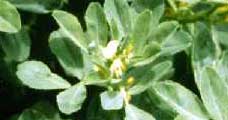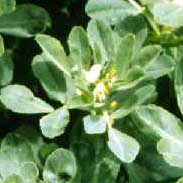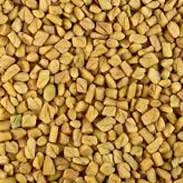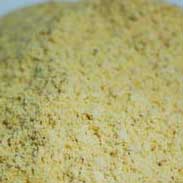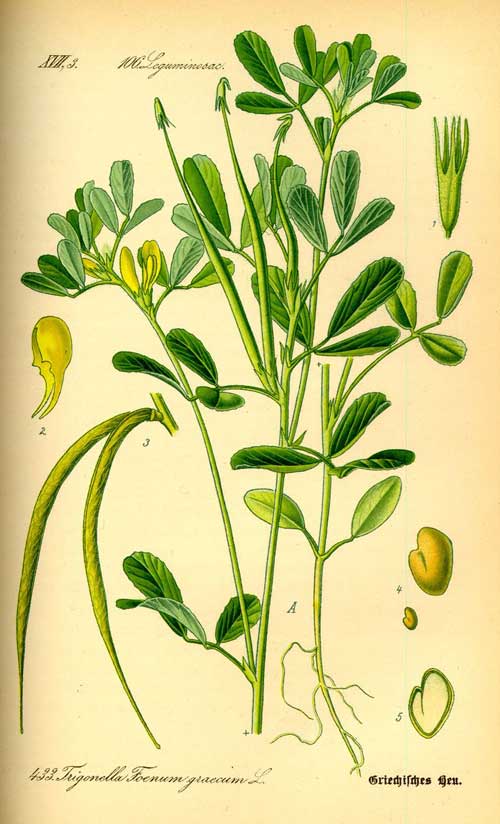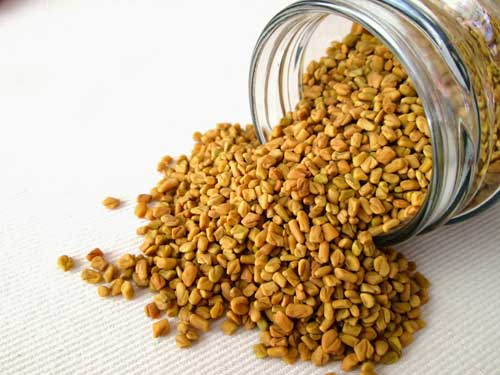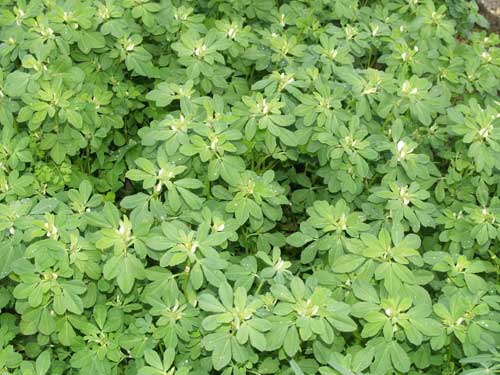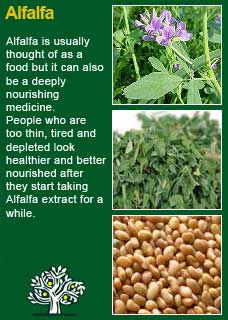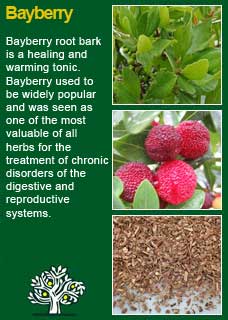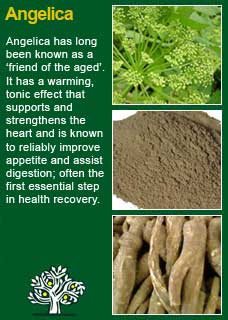
|
|
||||
| Our Pages ABOUT CONSTITUTIONAL MEDICINE
|
In herbal medicine, we use the seeds of Fenugreek, from the short lived herb that grows widely around the Mediterranean and the Middle East. The botanical name ‘foenum-graecum’ means ‘Greek-Hay’ in Latin as it is a herb that has often been cultivated as a crop for animals
Fenugreek has a rich folk history as both a food and a medicine to nourish a weakened system back to health; it has been much used in convalescence by some cultures. Medical indications for Fenugreek largely come from Ayurvedic and Chinese medicine where it is believed to help prevent and treat arthritis, improve libido and increase milk in nursing mothers. Fenugreek has been used for kidney complaints in traditional Chinese medicine for at least 1000 years. In the Western herbal tradition Fenugreek is thought to provide a soothing, demulcent coating over the lining of the digestive tract and in this system it has mostly been used to support a weakened or inflamed digestive system; typical indications for this kind of action include gastric and duodenal ulcers, diverticulosis, irritable bowel, Crohn's disease, fistulas, colitis and dysentery. Avicenna, in his Canon of Medicine, one of the most influential medical books in history, writes of Fenugreek as warming and drying. He says it 'clears the voice, nourishes the lungs, softens the chest and throat, soothes the cough and asthma, it is useful in weakness of the stomach and gastric ulcers and s also a good remedy for dysentery and diarrhoea' King's Dispensatory writes 'the Greeks were especially well acquainted with fenugreek, it being one of their most important medicines. A poultice (or plaster or ointment) of the powdered seeds, or a decoction, has been used on inflamed parts, and the latter has been used as a rectal and vaginal wash to soothe irritation or inflammation. Fenugreek has likewise been used to allay irritation of the throat and breathing passages. The infusion or tincture may be used as a tonic to improve digestion. It relieves uterine irritation and acts as an emmenagogue. Respiratory irritation is relieved by its internal use, and a heated sack of the ground seeds is regarded as a valuable application in chronic affections of the stomach, bowels, and liver
~ Fenugreek decreased the symptoms and duration of dyspepsia compared to placebo and worked as well as the commonly prescribed indigestion drug ranitidine (DiSilvestro RA, Verbruggen MA, Offutt EJ. Anti-heartburn effects of a fenugreek fiber product. Phytother Res 2011;25:88-91) ~ Fenugreek has been shown to increase the production of milk in nursing mothers (Forinash, A. B., Yancey, A. M., Barnes, K. N., and Myles, T. D. The use of galactogogues in the breastfeeding mother. Ann.Pharmacother. 2012;46(10):1392-1404) and (Zapantis, A., Steinberg, J. G., and Schilit, L. Use of herbals as galactagogues. J Pharm Pract. 2012;25(2):222-231) and (Zuppa, A. A., Sindico, P., Orchi, C., Carducci, C., Cardiello, V., and Romagnoli, C. Safety and efficacy of galactogogues: substances that induce, maintain and increase breast milk production. J Pharm Pharm Sci 2010;13(2):162-174) ~ Fenugreek has had an exceptionally high number of clinical studies done on its ability to reduce excess blood cholesterol and to improve blood sugar levels in patients with diabetes. The overwhelming evidence from these numerous studies mean that there can truly be no doubt that it is highly effective in both lowering blood cholesterol and improving blood sugar levels (Suksomboon N, Poolsup N, Boonkaew S, Suthisisang CC. Meta-analysis of the effect of herbal supplement on glycemic control in type 2 diabetes. J Ethnopharmacol 2011;137(3):1328-1333) and (Hasani-Ranjbar, S., Nayebi, N., Moradi, L., Mehri, A., Larijani, B., and Abdollahi, M. The efficacy and safety of herbal medicines used in the treatment of hyperlipidemia; a systematic review. Curr.Pharm.Des 2010;16(26):2935-294) and (Thompson Coon, J. S. and Ernst, E. Herbs for serum cholesterol reduction: a systematic view. J Fam.Pract. 2003;52(6):468-478) ~ The authors, titles and the 'where-and-when' published of around 180 further studies and articles on Fenugreek are listed in a PDF found here
For some years now, against this proven and safe way of herbalism, there has been a rising tide of excessive caution and scare-mongering in many parts of the world. The same authorities that, not so long ago, decried herbal medicines as ineffectual, have now taken up a different adversarial position; that they are dangerous substances that should only be prescribed by Doctors, who of course have zero training in them. Unfortunately, the same unnecessary fear and worry has crept into many natural health websites and popular publications on herbs. Herbs that we have safely used for thousands of years, that have no reports of adverse reactions in the medical literature despite widespread use by millions of people, are suddenly described as contraindicated because of something that should have been seen as completely unimportant, or at the utmost a merely theoretical concern, such as a laboratory study on one of the herb's constituents to use an all too common example. I wonder sometimes if the writers of such articles feel that the herb will be more deserving of respect if it is thought to be a little bit dangerous, in other words more like a drug than something that has simply come out of the earth and been used by ordinary people for generations beyond count. There is just so much misinformation about herbal medicine on the internet now. Ludicrous claims and cautions abound in equal measure; it seems like one group are trying to make money out of the public whilst the other are busily trying to scare them off. I have to believe that the kind of reader who takes the time to read pages on herbs that are as extensive as this one is much less likely to be swayed by marketers or misinformers. I hope that you will keep your wits about you if you get conflicting opinions from people who have never really got to know these herbs, who have never worked with them, or learned how to use them safely and effectively. I want to remind you that the reason that herbs can never be patented and owned by any individual or corporation is because they are, and always will be, the People's medicine. They belong to all of us and it is my great hope in sharing this work that you will learn how to use them wisely for yourself, and the people you care for. Be safe, but do not be afraid.
With respect to the interesting potential for its use for excess blood sugars and blood fats the way I personally use Fenugreek is as a warming and stimulating herb for people who are depleted and need to build up their blood and strength. Here it can be seen that quite small doses are remarkably stimulating to the digestive system and the use of Fenugreek for even just a few weeks can be tremendously fortifying to a person who has become weakened by illness or loss of physical condition. Fenugreek is a very strong-tasting herb, I recommend that people take it before food and then consciously allow its taste and action to penetrate. Even if you feel some aversion to its strong presence at first, be patient, and observe what is happening in your body. Assuming Fenugreek is the right herb for you; if you do this with an open mind I think you will feel a rather remarkable 'activation' of your digestion, a little like stoking up a fire. Further to this, if you would like to learn more about the ancient art of pulse testing, a simple but powerful way to ask the intuitive intelligence of the body for its responses to a herb by feeling the pulse whilst giving a tiny dose by mouth, read here Using a herb like Fenugreek to improve digestion can be a profoundly healing process for the body. Once we start digesting and absorbing our food better our ability to heal from almost any kind of illness or to simply recover our health is vastly improved and this is personally where I feel the great virtue of Fenugreek lies. Its ability to strongly nourish a weakened digestion back to health is a tremendous ally against aging and disease. I generally suggest taking it for just a few weeks then stopping for a break before potentially using it again if there are signs that it is still needed (the digestion or vitality weakening off again) As a tincture which is how I mostly use this powerhouse of a herb I have found that just small divided doses are usually ample to achieve the tonic effects we desire. For example, as little as 5-10 drops in a formula alongside other herbs, taken before food, can have a potent action without overpowering the senses. Fenugreek can combine particularly well with Alfalfa for anaemia or loss of physical condition, with Bayberry for problems involving poor circulation and with Angelica for a weakened digestion.
Much of the information here about the traditional uses of Fenugreek is consistent with the model of thinking whereby one may treat problem A with plant B. There is value in this approach, especially in how it helps us pass on useful knowledge to one another, but it falls short in one vital area; and that is that people are not all cut from the same cloth! Something that works brilliantly for one person may do little for another -- why is this? Part of the reason is that people vary in their constitutions as to whether they are either hotter or cooler and, at the same time, either dryer or damper. This useful and rather fascinating subject is introduced further here Another big part of using the right herb when it is most needed comes from understanding the need to treat what is going wrong for the person that had led up to their getting a health condition. In this light, Fenugreek can particularly offer its benefits when an activation is needed in the 'cycle of healing', more about this here
Please understand that I cannot advise you, including on products or dosage, without seeing you in person in my clinic but for ideas
on how you might find a good herbalist in your area read here |
|
|
|
© 2011 R.J.Whelan Ltd
